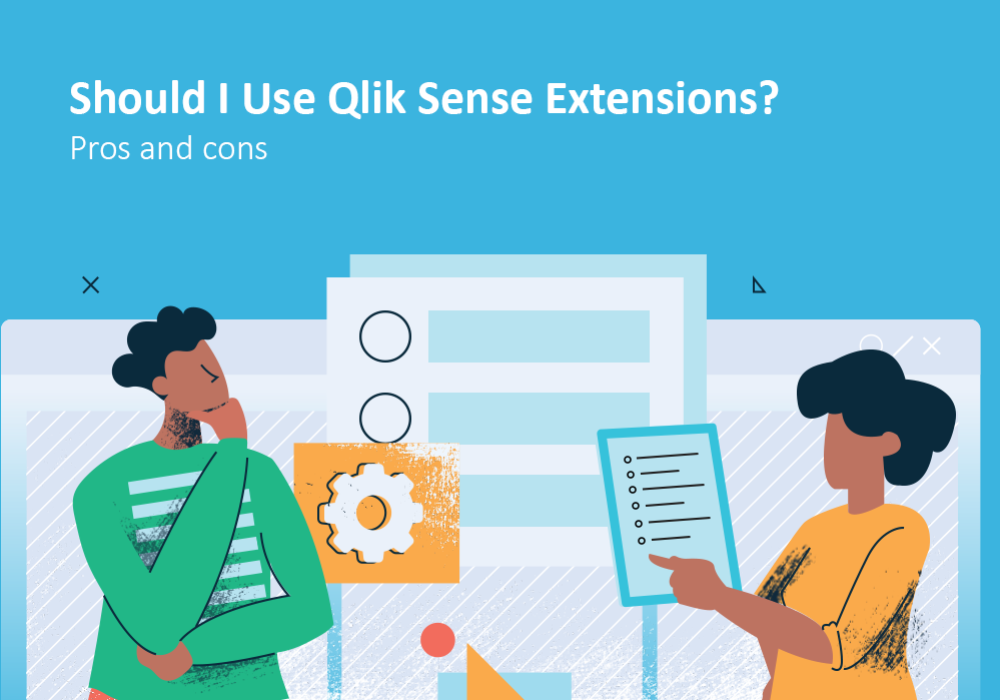
Should I Use Qlik Sense Extensions?
Qlik Sense is a BI platform offers users a variety of features to create interactive dashboards. Also it provides ability to use custom extensions, which are custom objects developed by the Qlik community and third-party developers. These extensions can enhance the functionality and aesthetics of your Qlik Sense applications, but the decision to use them should be made carefully. In this article, we'll explore the pros and cons of using Qlik Sense extensions to help you make a decision
Pros of Using Qlik Sense Extensions
-
Enhanced Visualization: Qlik Sense extensions can add specialized visualizations and charts that are not available out of the box. Especially for financial departments who likes tables. These extensions allow you to create more advanced visualizations that cater to your specific business needs. This can lead to better insights, improved decision-making and increases user satisfaction
-
Custom Functionality: Extensions offer the opportunity to include custom functionality that might not be present in the standard Qlik Sense environment. You can integrate third-party APIs, embed web content, and develop interactive features that align precisely with your organization's requirements.
-
Community Contributions: Qlik Sense has a thriving community of developers who create and share extensions. This means you can benefit from the creativity and expertise of others, potentially saving time and effort in development. Additionally, community-contributed extensions are often open-source, making them accessible and cost-effective.
-
Responsive Design: Extensions can be designed to be responsive and mobile-friendly, ensuring that your dashboards and visualizations look great and function well across various devices. This is crucial for maintaining a consistent user experience, especially in today's mobile-centric world.
Cons of Using Qlik Sense Extensions
-
Maintenance and Updates: While community-developed extensions can be valuable, they might not receive consistent updates or support. If an extension becomes outdated or incompatible with new versions of Qlik Sense, it could lead to issues, requiring you to invest time in finding alternatives or fixing the extension yourself.
-
Performance Concerns: Poorly designed extensions can negatively impact the performance of your Qlik Sense applications. Extensions that involve complex calculations or extensive data processing could slow down dashboard loading times and overall user experience.
-
Security Risks: Extensions often require access to your data, and if not developed with security in mind, they could potentially expose sensitive information. It's essential to carefully review the code and permissions of any extension you plan to use to ensure it meets your organization's security standards.
-
Limited Support: While Qlik provides support for its core platform, the same level of support might not be available for third-party extensions. If you encounter issues with an extension, you might need to rely on the developer or community for assistance, which can be unpredictable.
Conclusion
Deciding whether to use Qlik Sense extensions depends on your specific needs and circumstances. While extensions can greatly enhance your data visualization capabilities and provide unique functionality, they also come with potential challenges related to maintenance, performance, security, and support.
Before implementing any extension, it's crucial to thoroughly evaluate its compatibility with your Qlik Sense version, its reliability, and its impact on performance and security. Whenever possible, opt for well-maintained and reputable extensions from reliable sources, and consider your organization's long-term goals and resources.
Incorporating Qlik Sense extensions can be a valuable way to take your data visualization and business intelligence efforts to the next level, but making an informed decision and carefully managing their use will ensure you achieve the desired results without compromising on performance or security.




0 Comments